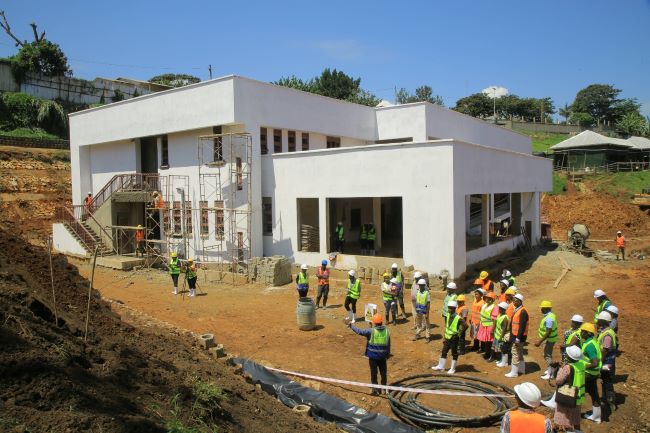FORT PORTAL CITY, October 25, 2024 — A new satellite laboratory under construction at Fort Portal Regional Referral Hospital [FRRH] is set to significantly boost clinical research in the Rwenzori Subregion and the neighbouring Democratic Republic of Congo ][DRC].
Doreen Nshabohurira, Communications Officer at the Uganda Covid-19 Response and Emergency Preparedness Project [UCREPP] in the Ministry of Health, noted that the hospital has faced challenges in conducting essential tests for diseases like Ebola, and Mpox due to a lack of equipment and specialists.
“In recent years, the hospital has struggled to carry out certain tests, especially during outbreaks, requiring the transportation of samples to Kampala for results, which is both time-consuming and resource-intensive,” Nshabohurira explained.
She expressed optimism that the new laboratory will enhance disease outbreak management capabilities, enabling instant and internationally recognised test results.
During a media tour of the project with Health ministry officials last week, Nshabohurira outlined the five key components of the initiative, which include contact tracing, reporting, and recording to ensure international recognition.
Dr. Oscar Kalisa, Acting Director of FRRH, highlighted the logistical difficulties faced in transporting samples to Entebbe, particularly during the Covid-19 pandemic, which delayed result processing.
He added: “This regional referral hospital serves the entire Rwenzori Subregion and the neighboring DRC, an area prone to outbreaks. Our hospital currently lacks the capacity for testing. I commend the Ministry of Health for prioritising our needs, as the tests conducted here will gain international recognition.”
He added that the laboratory will facilitate the diagnosis of various human diseases, delivering results promptly, including tests for viruses reported from the DRC. “The new laboratory will expand the range of services offered at the hospital. Our current facility operates in limited space, and some equipment procured by the government cannot be accommodated,” he noted.
“Currently, he said, the hospital is unable to offer detailed cancer screenings due to a lack of pathologist personnel, “but this modern laboratory will improve our capacity, allowing us to collect and test samples from the community and conduct research.”
Eng. Lauben Basiime, General Foreman from Azu Properties Limited, reported that construction of the facility began in January last year. Although originally scheduled for completion three months ago, delays occurred due to design changes and weather conditions, he said.
He confirmed that the project is now 80 percent complete, with an expected finish by the end of December and an official handover to the Health ministry planned for mid-January.
Last year, the ministry, under UCREPP and with funding from the World Bank and International Development Association, launched the construction of a Shs 5 billion satellite laboratory at FRRH in Western Uganda to strengthen the national system for public emergency preparedness.
The laboratory will feature components including a biorepository, phlebotomy, blood bank, serology, hematology, parasitology, molecular biology, immunology, histology, microbiology, and a TB laboratory, among others.
Buy your copy of thecooperator magazine from one of our country-wide vending points or an e-copy on emag.thecooperator.news
